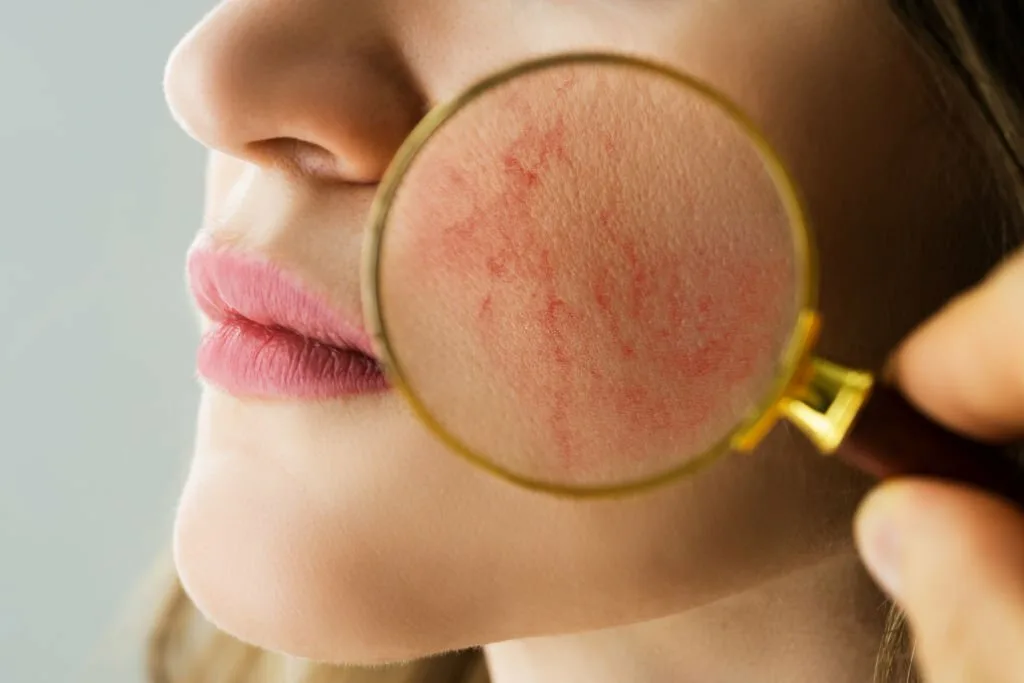Imagine a skin condition that leaves you perpetually red-faced. Rosacea does that to over 16 million Americans, causing visible blood vessels and persistent bumps.
Now, in this new era of serum and supplementation, people like me often ask: Is Vitamin C good for rosacea?
Vitamin C is good for rosacea. It reduces redness by strengthening blood vessels, while its anti-inflammatory and antioxidant properties heal inflamed skin, improve redness, and support healthy skin cells and collagen production. Besides, it boosts hydration, which minimizes dryness and redness.
But there’s more to the story of rosacea and its red alarm. So, stick with us to learn about rosacea and how vitamin C may help the condition.
Understanding Rosacea
Rosacea is a skin condition that usually affects the face. It results in persistent redness on the cheeks, nose, forehead, and chin. Also, it can cause discomfort and irritation in the eyes.
In short, if you notice visible blood vessels, bumps, and facial pustules, you may conclude it’s rosacea.
Causes of Rosacea
You may have rosacea for several reasons –
- Genetic predisposition
- Abnormal blood vessel function may dilate too easily, contributing to redness.
- Demodex mites
- An overactive immune response.
Symptoms of Rosacea
Some common symptoms of rosacea include-
- Persistent facial redness, often resembling a blush or sunburn
- Visible blood vessels (telangiectasia) on the face, particularly on the cheeks and nose
- Bumps and pimples on the affected area – similar to acne but without blackheads.
- Ocular symptoms – dry, irritated, and red eyes.
- Burning or stinging sensations on the skin.
- Swelling or puffiness in the affected areas, especially the nose.
- Rapid flushing, especially triggered by spicy foods, alcohol, or stress.
Is Vitamin C Good For Rosacea?
Yes, Vitamin C is good for rosacea. It contains anti-inflammatory properties that help heal and soothe inflamed skin from rosacea. Besides, Vitamin C is a powerful antioxidant that can work wonders in improving the appearance of redness by supporting healthy skin cells and collagen production.
And that’s not all! Vitamin C also helps with hydration, which is key in minimizing the reddening and drying skin that often accompanies rosacea.
But the best part is vitamin C sustains weakened blood vessels. Many experts believe that rosacea’s redness results from increased dilation and blood vessel fragility in the affected areas. A variety of environmental factors can exacerbate it. By bolstering the integrity of these vessels, Vitamin C may help to reduce the severity and frequency of rosacea flare-ups.

However, more research is needed in this area.
But remember that there is no definitive cure for Rosacea. Vitamin C’s anti-inflammatory and antioxidant properties may only offer some relief.
Does vitamin C reduce redness?
Vitamin C can help reduce redness induced by rosacea and other skin conditions.
- Anti-Inflammatory Properties: Calms and soothes skin to reduce redness caused by various factors.
- Evens Skin Tone: brightens the skin and promotes an even tone by reducing the red or blotchy areas.
- Reduction in Pigmentation: helps fade dark spots and red marks, especially with redness due to post-inflammatory hyperpigmentation.
- Protection from UV Damage: Research suggests that topical 10% vitamin C reduces UVB-induced erythema by 52% and sunburn cell formation by 40-60%.
- Enhancement of Collagen Production: improve the skin’s structure and potentially decrease the appearance of redness.
Fact check – can collagen help acne?
Vitamin C’s effectiveness in reducing redness varies from person to person due to factors such as skin type, cause of redness, and product quality. So, consult a dermatologist for personalized advice.
How To Use Vitamin C For Rosacea?
Here is a step-by-step guide on how to use Vitamin C for rosacea-
- Look for vitamin C serums or creams that contain 10-20% ascorbic acid (the active form of vitamin C). Start with a lower percentage if you have sensitive skin.
- Apply it in the morning after cleansing and before moisturizer and sunscreen. Vitamin C works best on clean, dry skin.
- Start using it 2-3 times per week and gradually increase to daily use as your skin tolerates it. Using it too often can irritate you. Vitamin C works best at a pH below 3.5. Look for formulations with ferulic acid or vitamin E, as these help stabilize vitamin C and boost its effectiveness.
- Be patient. It can take 6-8 weeks of regular use to see results from vitamin C, such as decreased redness and inflammation.
- Always do a patch test first. Dab a little on your jawline and wait 24 hours to check for any reaction before applying it all over your face.
- Vitamin C can increase sun sensitivity, so be diligent about applying SPF 30+ sunscreen every day.
Check if you can get vitamin C from the sun.
Can I Use Vitamin C Serum With Metronidazole For Rosacea?
Yes, using vitamin C serum with metronidazole for rosacea is generally safe. But use the metronidazole first. You can also use the vitamin C serum in the mornings to avoid combining it with the metronidazole at night.
Here are ways to use them together safely.
- Apply a thin layer of your prescribed metronidazole cream or gel all over the affected areas. Let it fully absorb into the skin.
- Wait 10-15 minutes before applying the vitamin C serum. This allows the metronidazole to fully penetrate and start working before using vitamin C.
- Dry your skin before applying vitamin C serum, as it works best on bare skin.
- If your skin becomes irritated, use the product less.
- Avoid scrubbing the face.
Can you take vitamin C with turmeric?
Can Vitamin C Cause Redness In Face?
Yes, when used in high concentrations (over 15-20%), Vitamin C may cause redness or irritation on the face. It has a low pH, usually around 3.5 or lower, which can sting sensitive skin if not formulated properly. So, adjust the usage of Vitamin C gradually, especially if you have sensitive skin, to avoid skin irritation.
Always do a patch test first. It can help identify if your skin will react with redness or flushing.
Also, don’t layer vitamin C with other acidic products, like chemical exfoliants, as it can over-irritate and redden the skin.
Alternatives To Vitamin C For Rasacea
Here are some good alternatives to vitamin C serums to consider for rosacea-prone skin.
- Niacinamide (vitamin B3) – Helps reduce inflammation and redness. Look for a 5-10% niacinamide serum. You can layer niacinamide with vitamin C.
- Prescription Azelaic acid – Reduces redness and swelling.
- Aloe vera – The fresh gel has cooling and soothing properties. Opt for pure formulas without added fragrance.
- Hyaluronic acid – Binds moisture to the skin and reduces irritation. Great for dehydrated skin.
- Sulfur – Has antibacterial and exfoliating effects. Often found in masks and spot treatments.

FAQ
Does vitamin C make rosacea worse?
No evidence suggests that Vitamin C worsens rosacea. It’s safe for sensitive skin and rosacea sufferers.
Is hyaluronic acid good for rosacea?
Hyaluronic acid is good for rosacea. It soothes and repairs rosacea-prone skin by reducing redness and swelling.
Is niacinamide good for rosacea?
Niacinamide (vitamin B3) is effective against rosacea. It reduces redness and inflammation and regulates oil production. It’s safe to use with most skincare ingredients.
Is retinol good for rosacea?
Dermatologists debate using retinol for rosacea. Retinol can help with breakouts and texture but sometimes worsens irritation, redness, and capillaries.
Bottom Line
Is vitamin C good for rosacea? Vitamin C is great for rosacea. It helps treat rosacea by improving skin tone, reducing inflammation, and boosting hydration.
But always consult a dermatologist or do a patch test before applying new products to the face.
For more, don’t forget to visit our latest blogs.

I am a health and wellness enthusiast working in a Pittsburgh-based wellness clinic. My primary role as a consultant is to tailor a balanced lifestyle for my patients, where positive steps and potent supplements play a synergistic role.


